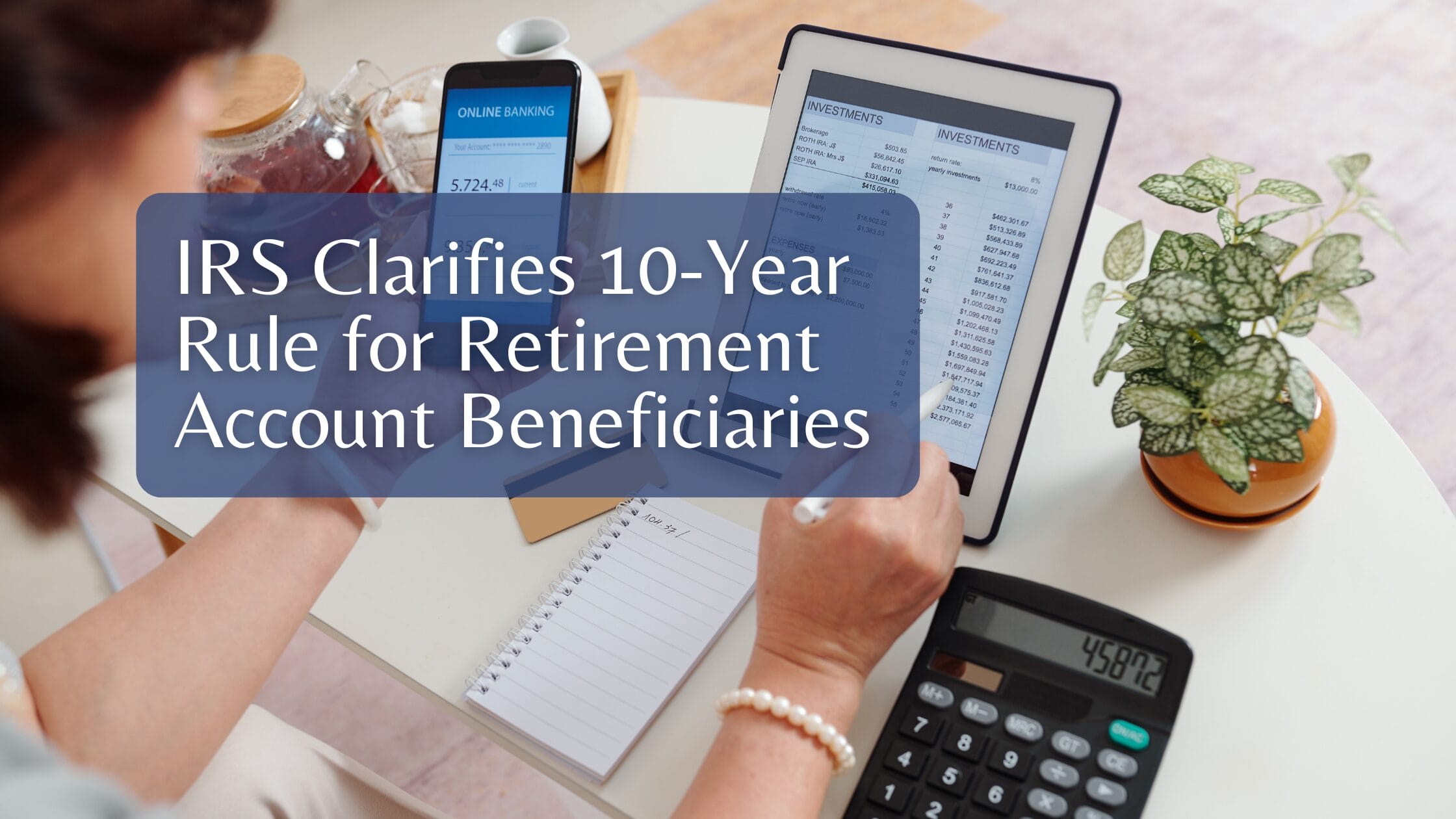IRS Clarifies 10-Year Rule for Retirement Account Beneficiaries

The IRS recently issued guidance on the annual distributions for beneficiaries of retirement accounts. The 10-Year Rule for inherited retirement accounts was created as part of the SECURE Act, which was signed into law on December 20, 2019. The 10-Year Rule generally requires that beneficiaries of inherited IRAs and other retirement accounts must withdraw the entire balance by the end of the tenth year following the account holder’s death. This rule replaced the previous “stretch IRA” provisions, which allowed non-spouse beneficiaries to extend distributions over their lifetime.
The provisions of the SECURE Act, including the 10-Year Rule, generally took effect on January 1, 2020. This rule applies to beneficiaries who inherit retirement accounts from individuals who passed away on or after that date. What was not clear was if the beneficiaries had to take annual distributions from the accounts during the ten-year period or if the account just needed to be distributed by the tenth year. The answer lies in the decedent’s age and situation.
Annual Distribution Requirements
A 10-year beneficiary must make annual distributions if they inherit a retirement account after 2019 and the decedent passed on or after their Required Beginning Date (RBD) or was taking life expectancy distributions. Basically, if the decedent was subject to distributions before they passed, then the beneficiary who inherits the account must make annual distributions of a minimum amount based on their life expectancy. They still must distribute the entire account by year ten.
Distribution Strategy
Depending on the size of the account and your other income, it may make sense to take a larger amount each year to minimize taxes over the whole time period. An example may help.
Let’s assume Jane is 46 and inherits a $500,000 IRA from her father, who was 78 in 2023 when he died. Since her father was past his RBD date, Jane must make annual distributions based on her life expectancy at a minimum of around $12,500. She must distribute the entire account before December 31, 2033. Therefore, if she took the minimum amount each year, that would only be around $125,000. She would still need to distribute the remaining $375,000. This is where she can work with an accountant or her financial advisor to consider the other income in each of the 10 years and maybe distribute more to spread the taxes out each year.
Pre-RBD Inheritance
If a beneficiary inherits the account prior to the decedent reaching their RBD date, then they are not required to make distributions annually. However, just as the example outlined above, they may want to take distributions to spread the taxes over several years depending on their other income.
Roth Inherited Accounts
Roth inherited accounts will also follow the pre-RBD date rule as the decedent is not subject to RMDs. However, the beneficiary still must distribute the entire account by year ten although not taxable. If you don’t need the cash flow, it may make sense to keep the account invested and allow it to grow tax-free for 10 years and then take it out at the end.
Have questions? Feel free to contact us.
Shawna Theriault, CFP®, CPA, CDFA®
Senior Financial Advisor, Wiser Wealth Management
Share This Story, Choose Your Platform!
Wiser Wealth Management, Inc (“Wiser Wealth”) is a registered investment adviser with the U.S. Securities and Exchange Commission (SEC). As a registered investment adviser, Wiser Wealth and its employees are subject to various rules, filings, and requirements. You can visit the SEC’s website here to obtain further information on our firm or investment adviser’s registration.
Wiser Wealth’s website provides general information regarding our business along with access to additional investment related information, various financial calculators, and external / third party links. Material presented on this website is believed to be from reliable sources and is meant for informational purposes only. Wiser Wealth does not endorse or accept responsibility for the content of any third-party website and is not affiliated with any third-party website or social media page. Wiser Wealth does not expressly or implicitly adopt or endorse any of the expressions, opinions or content posted by third party websites or on social media pages. While Wiser Wealth uses reasonable efforts to obtain information from sources it believes to be reliable, we make no representation that the information or opinions contained in our publications are accurate, reliable, or complete.
To the extent that you utilize any financial calculators or links in our website, you acknowledge and understand that the information provided to you should not be construed as personal investment advice from Wiser Wealth or any of its investment professionals. Advice provided by Wiser Wealth is given only within the context of our contractual agreement with the client. Wiser Wealth does not offer legal, accounting or tax advice. Consult your own attorney, accountant, and other professionals for these services.





